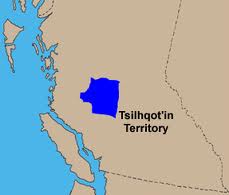Great news today as Canada’s Supreme Court gave First Nations more than they dared hope for.
For the first time! the court granted aboriginal people title to their land. The unanimous 8-0 vote deeds them over 675 square miles in central British Columbia.
About 3000 people are part of Tsilhqot’in – a collection of six aboriginal bands.
The court ruled because the tribe wasn’t consulted when commercial logging was approved. They have been trying stop clear-cut logging for decades.

The ruling, of course, will make it that much harder for the Northern Gateway tar sands pipeline. Approved last week, it would pass right through Tsilhqot’in territory, and the 132 First Nations are united in fighting it.
When tribal leaders heard the news the mood was "absolutely electrifying." "It only took 150 years, but we look forward to a much brighter future. This, without question, will establish a solid platform for genuine reconciliation to take place in British Columbia," says Stewart Phillip, Grand Chief and president of the Union of British Columbia Indian Chiefs, told CBC News. "I didn’t think it would be so definitive. I was actually prepared for something much less.
It’s not very often that I’m without words, and I’m quite overwhelmed at the moment."
"We are in an entirely different ballgame," he told The Star. "We’re moving away from the world of mere consultation into a world of consent. And that is absolutely enormous when one considers Enbridge’s Northern Gateway pipeline proposal, the Kinder-Morgan proposal, and a whole multitude of major resource projects."
The decision over-rules a 2012 BC Court of Appeals decision that gave the tribe sweeping rights to hunt and trade on their traditional land, but to gain title they would have to identify specific sites where they lived over the centuries, rather than claim the entire area. Because they are semi-nomadic, the Supreme Court ruled they need only show that they have inhabited the land, exclusively and continuously.
But there’s a catch. Provincial and federal governments can carry out economic activity on their land if the tribe consents or failing that, if government can make the case that development is "pressing and has a substantial public purpose" and meets its fiduciary duty to the aboriginal group.
"We support Indigenous peoples’ right to free, prior and informed consent," says Maude Barlow, National Chairperson of the Council of Canadians, which intervened in the case. "They are the rightful stewards of their lands, and should be the ones to decide if and how they are developed. At last, this is sign that there is no blank cheque for the Northern Gateway project."
The British Columbia and federal government are negotiating some 100 land claims across the country.
No federal government, oil pipelines or trains are not a “development that is pressing”, nor are they “a substantial public purpose”.